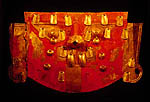Part 1
"We both felt we had earned the right to see Machu Picchu."
Photo: Marcia Brandes.
We need to go to Machu Picchu
One evening last fall Steve was reading his weekly Economist when he suddenly announced, "We need to go to Machu Picchu for our vacation this year." This came as somewhat of a surprise to me, since Steve's attitude towards our travels is usually to find out from me on the way to the airport which country or state we are visiting this time. It seems, however, that he had read of the possibility that the Peruvian government might authorize a tramway to be built up the side of the mountain to Machu Picchu. Already overcrowded with tourists during the dry season, with tour buses winding up the narrow road every 10-15 minutes, the grandest construction of the Incas could soon rival Atlanta freeways for the long lines waiting to squeeze through in jam-packed frustration.
After hearing this news, I researched the subject on the internet, and discovered that the appalling project had been put on hold, at least for a while. Such a construction, although presumably bringing millions more tourists to Peru, could also lose Machu Picchu its World Heritage Site status. One can always hope it will never be built. Nevertheless, I agreed with Steve that we didn't want to take a chance on getting there before it was too late, so I immediately started to collect the books, web sites, and assorted information I would need to plan our trek for this summer.
The general information in the travel books about our neighbor to the south, coupled with State Department Bulletins, CDC warnings, and general gossip, would easily convince you that you should never stray from your living room. For the very intrepid, maybe south Florida -- but South America? We were warned about nefarious taxi drivers, malaria, pickpockets, yellow fever, the Shining Path, drug smugglers, corrupt police, 27 types of gastrointestinal disorders, dangerous roads, rickety buses, high winds, lost luggage, medical evacuations, rabid dogs, and tropical diseases with unpronounceable names. And that's just in Lima.
What we found instead was a beautiful and incredibly varied country; warm, friendly and highly industrious people who were very solicitous of tourists; buses, trains and planes that ran precisely on time; delicious food (and drinks), frequently accompanied by spirited music and dancing; exotic wildlife; a system of terracing and hydraulic engineering that is unequalled in the world; and a fascinating cultural and political history that reaches back for thousands of years.
We traveled to four main areas in Peru, besides the capital, Lima. First, we headed south to the driest desert in the world; then we visited the intellectual city of Arequipa and the world's deepest canyon; next we made our pilgrimage to Cusco, the Sacred Valley, and Machu Picchu; and finally, after all these meaty exploits, we gave ourselves four days in the Amazon basin jungle for dessert.
We left Atlanta, after our obligatory three hours enjoying the comforts of Hartsfield International Airport, about 4:30 pm, arriving in Lima at 10:30 pm the same evening. The really nice thing about travelling to South America is that you don't have the jet lag you get when flying east or west. Peru is actually in the same time zone as Atlanta, although the absence of daylight savings placed it one hour earlier. The other nice thing, if you are leaving an Atlanta summer, is that the season south of the equator is winter. And since you are not very south of the equator, it's a very mild winter. Steve did have a hard time getting used to the fact that the sun went the wrong way and the shadows all followed in the wrong direction, but in general I felt very little dislocation.
Responding to the warning about taxis in Lima, I had arranged with a travel agency for a transfer from the airport to our hotel, and another transfer to the express bus the next morning. The transfer drivers were friendly and polite, and spoke about as much English as I do Spanish. Unfortunately, we both learned the same 2 dozen words, so our sentences tended to be fractured constructs of 1/2 English and 1/2 Spanish., with lots of smiling, nodding, and helpless hand gestures all around. Our pocket Spanish-English dictionary proved invaluable.
Next month: Why would anyone want to draw hummingbirds the size of football fields?
© 2013 Marcia Brandes. All rights reserved.

